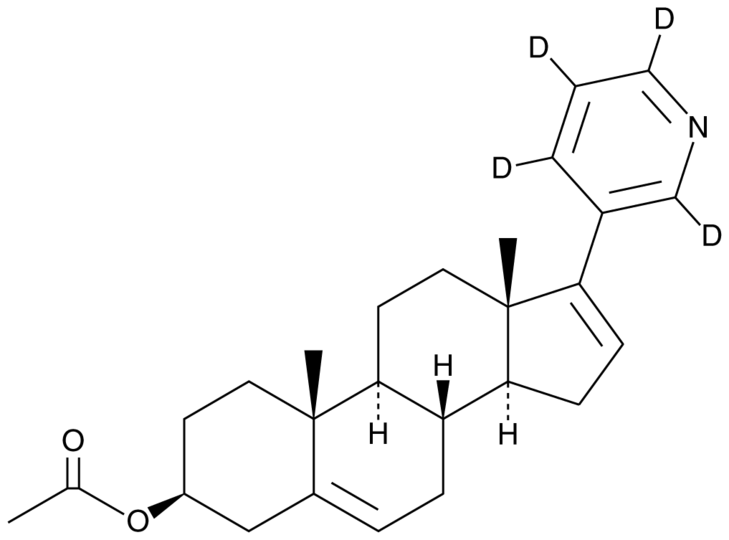Abiraterone acetate is an inhibitor of the cytochrome P450 (CYP) isoform CYP17A1 used to treat prostate cancer. It is sold under the brand name Zytiga. Abiraterone acetate is combined with steroid prednisone after the removal of testicles or with a gonadotropin-releasing hormone (GnRH) analog. This drug may suppress testosterone production by the testes and the adrenals.

Enquire Now
What is Abiraterone Acetate?
Product Description
Molar Mass: 391.555
SMILES: CC(=O)O[C@H]1CC[C@@]2([C@H]3CC[C@]4([C@H]([C@@H]3CC=C2C1)CC=C4C5=CN=CC=C5)C)C
InChIKey: UVIQSJCZCSLXRZ-UBUQANBQSA-N
ALogP: 5.4
CAS Number: 154229-18-2
Chemical Formula: C26H33NO2
Form: Tablets
Bioavailability: Unknown, but maybe 50% at most on an empty stomach.
Solubility: DMF: 16 mg/ml, DMSO: 2 mg/ml, Ethanol: 16 mg/ml, Ethanol:PBS (pH 7.2)(1:2): 0.3 mg/ml
Storage: -20°C
Suitable for: Adults
IUPAC Name:
[(3S,8R,9S,10R,13S,14S)-10,13-dimethyl-17-pyridin-3-yl-2,3,4,7,8,9,11,12,14,15-decahydro-1H-cyclopenta[a]phenanthren-3-yl] acetate

Approved Indications: 2
As per the clinical trials, there are two major approved indications of the Abiraterone Acetate drug:
- Prostatic Neoplasms
- Prostatic Neoplasms, Castration-Resistant
Experimental Indications: 53
As per clinical trials 1-4, the drug can be used in the following categories:
- Abiraterone Acetate (Early Phase 1)
- Adrenal Hyperplasia, Congenital (Phase 2)
- Adrenocortical Carcinoma (Phase 2)
- Anemia (Phase 1)
- Astrocytoma (Phase 1)
- Brain Neoplasms (Phase 1)
- Breast Neoplasms (Phase 3)
- Carcinoma, Non-Small-Cell Lung (Phase 1)
- Carcinoma, Ovarian Epithelial (Phase 1)
- Carcinoma, Transitional Cell (Phase 2)
- Castration (Phase 3)
- Colorectal Neoplasms (Phase 1)
- Congenital Hyperinsulinism (Phase 2)
- COVID-19 (Phase 3)
- Cushing Syndrome (Phase 2)
- DNA Repair-Deficiency Disorders (Phase 2)
- Drugs, Investigational (Phase 2)
- Drug Therapy, Combination (Phase 2)
- Glioblastoma (Phase 1)
- Healthy Volunteers (Phase 1)
- Hodgkin Disease (Phase 1)
- Leukemia, Lymphocytic, Chronic, B-Cell (Phase 1)
- Leukemia, Myelogenous, Chronic, BCR-ABL Positive (Phase 1)
- Leukemia, Myeloid, Acute (Phase 1)
- Leukemia, Myeloid, Chronic, Atypical, BCR-ABL Negative (Phase 1)
- Leukemia, Myeloid, Chronic-Phase (Phase 1)
- Leukemia, Myelomonocytic, Chronic (Phase 1)
- Liver Diseases (Phase 1)
- Lymphoma (Phase 1)
- Lymphoma, Non-Hodgkin (Phase 1)
- Lymphoma, Primary Cutaneous Anaplastic Large Cell (Phase 1)
- Metabolic Diseases (Phase 1)
- Multiple Myeloma (Phase 1)
- Myelodysplastic Syndromes (Phase 1)
- Myeloproliferative Disorders (Phase 1)
- Neoplasm Metastasis (Phase 3)
- Neoplasms ()
- Pancreatic Neoplasms (Phase 1)
- Pharmaceutical Preparations (Phase 2)
- Pharmacokinetics (Phase 1)
- Pharmacology (Phase 1)
- Plasma (Phase 1)
- Polymorphism, Genetic (Early Phase 1)
- Postmenopause (Phase 2)
- Precursor B-Cell Lymphoblastic Leukemia-Lymphoma (Phase 1)
- Primary Myelofibrosis (Phase 1)
- Prostatectomy (Phase 2)
- Prostatic Neoplasms ()
- Prostatic Neoplasms, Castration-Resistant (Phase 4)
- Renal Insufficiency (Phase 1)
- Salivary Gland Neoplasms (Phase 2)
- Triple-Negative Breast Neoplasms (Phase 1)
- Urinary Bladder Neoplasms (Phase 2)
Clinical Trials:
A total of 242 trials were held in four phases. 177 organizations participated in these trials.
Side Effects:
Major side effects observed after the consumption of Abiraterone Acetate are:
- Urinary Tract Infection
- Hypokalemia
- Hypertension
- Diarrhea
- Peripheral Edema
Product CAS No
154229-18-2
Therapeutic Action
This medication is used to treat prostate cancer. Abiraterone belongs to anti-androgens (anti-testosterone). Testosterone, a natural hormone, helps prostate cancer to grow and spread.
Conclusion
Abiraterone acetate belongs to a class called androgen biosynthesis inhibitors. It is used in adult makes to treat prostate and testicle cancer. It is sold under the brand Zytiga and has a molar mass of 391.55 g/mol. Besides treating prostate cancer, it also has an experimental indication to be used in treating COVID 19. Some common side effects of Abiraterone acetate are tiredness, headache, and vomiting.

